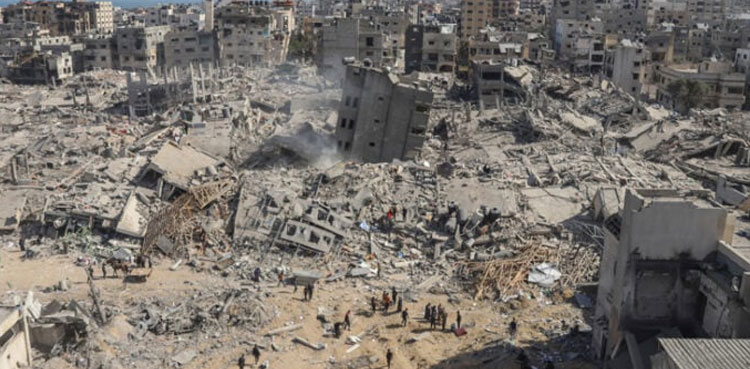
Israel pulled its forces out of the southern Gaza Strip on Sunday in a partial withdrawal that came half a year into the war broke out on October 7.
After the troops left areas in and around the largely destroyed city of Khan Yunis, a stream of displaced Palestinians walked there, hoping to return to their homes from temporary shelters in far-southern Rafah.
An Israeli security expert said the withdrawal in no way means the war is over.
The Israeli army said a “significant force” would stay on elsewhere in the besieged territory as Prime Minister Benjamin Netanyahu said Israel was “one step away from victory”.
Muhammad Yunis, 51, a Palestinian in northern Gaza, sees nothing but loss.
“Isn’t the bombing, death and destruction enough?” he asked. “There are bodies still under the rubble. We can smell the stench.”
On a day when talks toward a truce deal were set to resume in Cairo, Netanyahu also stressed that “there will be no ceasefire without the return of hostages”.
He is facing intense pressure at home, from families and supporters of hostages seized by the militants, and from a resurgent anti-government protest movement.
Aid workers killed
“Israel is ready for a deal, Israel is not ready to surrender,” he told his cabinet in a speech to mark six months since Hamas’s attack on southern Israel.
Israel has faced growing global opposition to the war, and a chorus of outrage over the killing of seven aid workers of the US-based food charity World Central Kitchen in a drone strike on April 1.
Vast areas of Gaza have been turned into a rubble-strewn wasteland, and British Foreign Secretary David Cameron on Sunday warned the “prospect of famine is real” in Gaza.
Netanyahu has come under heightened pressure from Israel’s top ally the United States to work toward a truce and hostage deal and to allow vastly more aid into the territory.
Trucks entered Sunday via Egypt’s Rafah crossing, the main aid entry point, and medical supplies were delivered for the first time through Israel’s Erez border point with northern Gaza, AFP TV footage showed.
Months of fighting in Khan Yunis left the city in ruins.
The city is the hometown of Hamas’s Gaza chief Yahya Sinwar, whom Israel accuses of being the mastermind of the October 7 attacks.
‘Bombing and starvation’
The partial withdrawal came as talks towards a truce and hostage release deal were expected to resume in Cairo, including United States, Qatari and Egyptian mediators.
The US envoy, CIA chief Bill Burns, met Egypt’s President Abdel Fattah al-Sisi ahead of the talks.
He and Qatari Prime Minister Sheikh Mohammed bin Abdulrahman Al-Thani will join Egyptian officials for indirect talks between the Israeli and Hamas delegations, Egypt’s Al-Qahera News said.
Netanyahu had long threatened a ground offensive in Rafah city on the Egyptian border, sparking global concern for around 1.5 million Palestinians sheltering there.
United States President Joe Biden told Netanyahu on Thursday he wants to see a ceasefire and hostage release deal and ramped-up aid deliveries.
After the deaths of the seven aid workers, Biden — whose government is Israel’s top arms supplier and political backer — also hinted at making US support for Israel conditional on curtailing the killing of civilians and improving humanitarian conditions.
Hours after Biden’s comments, Netanyahu said Israel would allow “temporary” aid flow through Erez and Ashdod.
Yunis, the Palestinian father of six in northern Gaza, told AFP the territory’s people desperately need a reprieve.
“It’s been half a year and the bombing and starvation continue,” said the man from Beit Lahia, now a broken landscape of shattered buildings.
“Watching the thin bodies of our children takes away our souls… I feel helpless and humiliated,” he said.
Mass Israeli protests
People gathered Sunday at the site of the Nova desert music festival to pay tribute to the young revellers who were killed or kidnapped there on October 7.
Israel’s retaliatory action has killed at least 33,175 people in Gaza, mostly women and children, according to the health ministry in the Hamas-run territory.
Most of Gaza’s hospitals no longer function and the largest, Al-Shifa, is “now an empty shell with human graves”, said World Health Organization head Tedros Adhanom Ghebreyesus.
Tens of thousands rallied in Tel Aviv and other cities on Saturday, demanding “elections now”. They were joined by families and supporters of the Gaza hostages.
Among the protesters was Israel’s centrist opposition leader Yair Lapid, who was later headed to Washington, his Yesh Atid party said.
Fears that the war could spread have intensified after Iran vowed retaliation for the killing of seven Revolutionary Guards in an air strike April 1 on the consular annex of its embassy in Damascus.
Yahya Rahim Safavi, senior adviser to Iran’s supreme leader Ayatollah Ali Khamenei, was quoted as saying by the ISNA news agency that “the embassies of the Zionist regime are no longer safe”.
from ARY NEWS https://ift.tt/BXRuwdh
